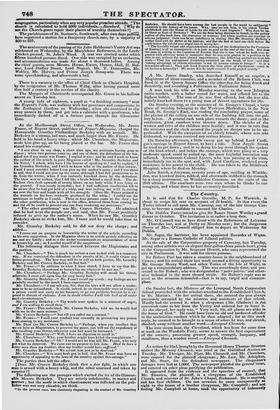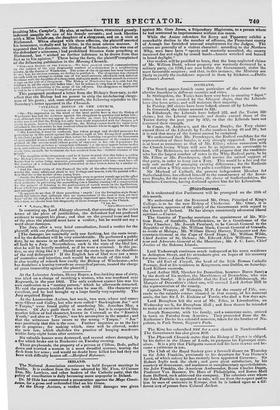An action for libel, brought by the Reverend Henry Thomas
Streeten against the Morning Chronicle, was tried at the Guildford Assizes on Tuesday. Mr. Thesiger, Mr. Platt, Mr. Channell, and Mr. Chambers, were counsel for the plaintiff clergyman ; Mr. Law, Mr. Adolphus, and Mr. Steer, for the defendant newspaper. The clergyman's damages were laid at 1,000/. The newspaper pleaded the general issue, and entered six other pleas justifying the publication. It appeared from the evidence and the speeches of counsel, that Mr. Streeten, the plaintiff, is a clergyman of the Established Church, and minister of St. John's Chapel, Richmond. He is married, and has four children. On one occasion he came unexpectedly at night to the house of a brother clergyman, Mr. Campbell ; and not finding Mr. Campbell at home, took the opportunity of indecently
insulting Mrs. Campbell He also, M various times, committed grossly. indecent assaults on one of his female servants ; and took liberties with a Miss Delafolse, the daughter of a clergyman, and on a visit at Richmond. When charged with these offences, the plaintiff asserted his innocence, verbally and by letter, in the most solemn manner. It appeared that Ms diocesan, the Bishop of Winchester, (who was one of the defendant's witnesses,) had prohibited Streeten from preaching at Richmond, 'out " wished no further inference to be drawn from that fact as to his opinion." These being the facts, the plaintifreomplained of the following publication in the Morning Chronicle.
STILR'NoE DoiNos IN TIM CM/Wm.—We have receieed several communications on the subject of the very disgraceful conduct of a clergyman in a neighbouring county in the diocese of Winchester. The name of the chtrgyman has been furnished to us; but, for obvious reasons, we decline to publiah it. The clergyman was charged on oath with an attempt to violate one of his maid-servants, afterwards took indecent freedoms with the daughter of a clergyman, and again made a violent assault to commit a rape on the wife of a clergyman. The Bishop or Winchester has, it is said, had the evidence in all the cases laid before him; but he refuses to strip him of his gown, and only forbids his preaching at the scene of his offences. The clergyman so implicated is said to be a distinguished Evangelical preacher."
This paragraph produced a letter from the Bishop's Secretary, to the effect that the Bishop had no power to strip the misbehaving clergy- man of his gown ; and, soon afterwards, the following rejoinder to the Secretary's letter appeared in the Chronicle.
" STRANGE DOINGS IN THE CHURCH.
" TO THE EniToR OF THE moRNINO CHRONICLE.
" Sir—The impression on the mind of the local public here is, that the Bishop of Winchester has had the evidence against the clergyman in question laid before him ; nail, although this does not appear to be strictly so, since his Lordship's Secretary writes you won't that the Bishop has only been made acquainted with the charges, yet surely in plain, honest. Christian simplicity, the Bishop cannot doubt the value to be attached to the statements he has received when he knows where to apply for the depo- sitions made on the occasions alluded to. "
this Lordship, if must be confessed, has taken prompt and decided measures for protecting us in this parish against the offensive sight of this Evangelical gentleman in his (late) pulpit ; but it appears that, before his Lordship can protect the thousands of pure-minded women within his diocese against a continuance of the conduct com- plained of, the servant-maid (whose purity of character is her sole dependent.° for subsistence) must go before a • competent tribunal,' i. e. she must appear before twelve men, and undergo the mental tortures of a tross.exantinatioa before an open court, and again state, on oath, the treatment she has received from this ' faithful minister of the gospel.' " The daughter of the clergyman—and be it borne in mind. that this father is within the Bishop's diocese, there exercising his duties, and whose statement the Bishop knows how to value, being. moreover, personally acquainted with him—must have all the barriers of a relined and finished education at once broken down by a similar re- % oiling ordeal. •• And the third victim of this Cantwell, the wife of the other clergyman, must also receive the same additional shock to her feelings and morals, with the painful reflec. lion that she is the mother of two young boys. 'Surely the Bishop's authority is inadequate even to protecit morals aga:rat the IS'ect of these clerical asgaults; and yet we hear of other dignitaries of the Church exercising their authority ill preventing the assembling (on a Sunday evening) of a congregation for the purpose of listening to the performance of sacred music on the Apollonicon. From winch two public exhibitions are the public morals most likely to be insulted and outraged? "It appears to me that if these preaching • angels' (as the Irvingites style them) would but believe that although they are ambassadors of the word of God, yet they have • all the ills that flesh is heir to' as strongly impressed upon them as they are upon other men, we should hear less ftaxpleutly of these strange doings in the Church. "I am, Ace.
••• • 0, Surry, May 28. " ANT1-IIYPOCRITx."
In summing up, Lord Abinger observed, that according to the strict terms of the pleas of justifidtion the defendant had not produced evidence to support his pleas ; and that on the general issue and four of the pleas the plaintiff must have a verdict ; but he would not say a word about damages.
The Jury, after a very brief consultation, found a verdict for the plaintiff, with one fardling damages.
The damages are nominally only one farthing, but the costs incur- red by the defendant will be very considerable. He performed a public duty. by no means in an offensive manner; and has been acquitted of all fault by a Jury. Nevertheless, such is the state of the libel law, that he will be heavily mulcted, as if he were a criminal. Is this jus- tice or any thing like it? Should not the costs lie upon the shoulders of the i
e real delinquent ? If the English law of libel were not a mass of anomalies and injustice, such would be the result of this trial. It is also worthy of remark how coolly the Bishop of Winchester—who Las doubtless a leaning towards an evangelical parson, treated the charge of gross immorality against the plaintiff.)



























 Previous page
Previous page